S1-MODULE3 My First Ride on a Train[上学期]
文档属性
| 名称 | S1-MODULE3 My First Ride on a Train[上学期] | 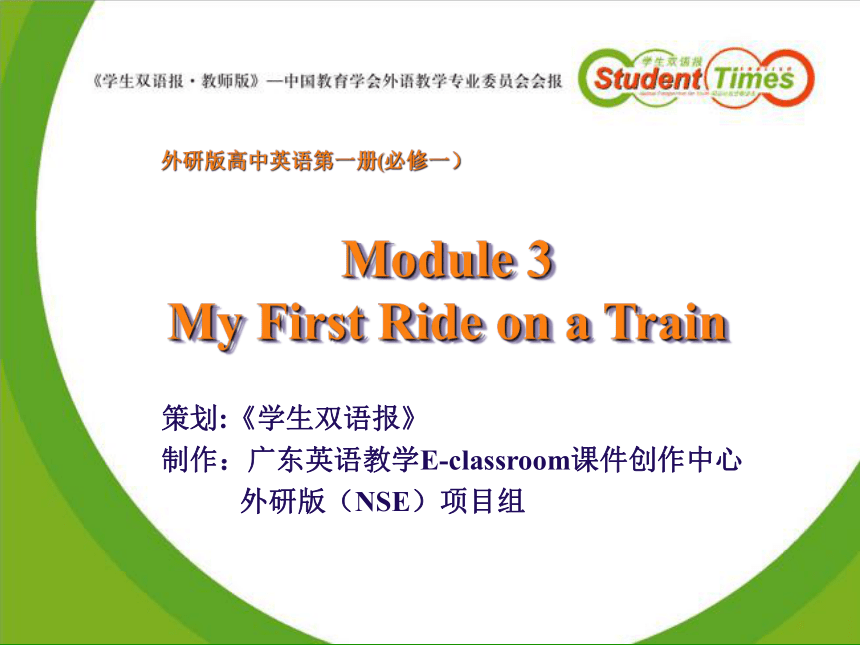 | |
| 格式 | rar | ||
| 文件大小 | 393.9KB | ||
| 资源类型 | 教案 | ||
| 版本资源 | 外研版 | ||
| 科目 | 英语 | ||
| 更新时间 | 2006-10-14 08:47:00 | ||
图片预览

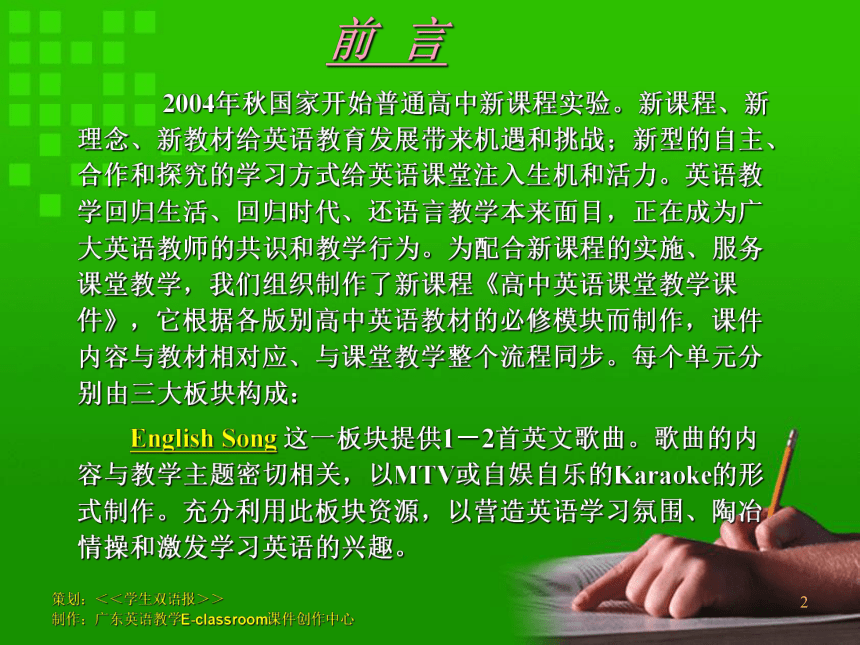
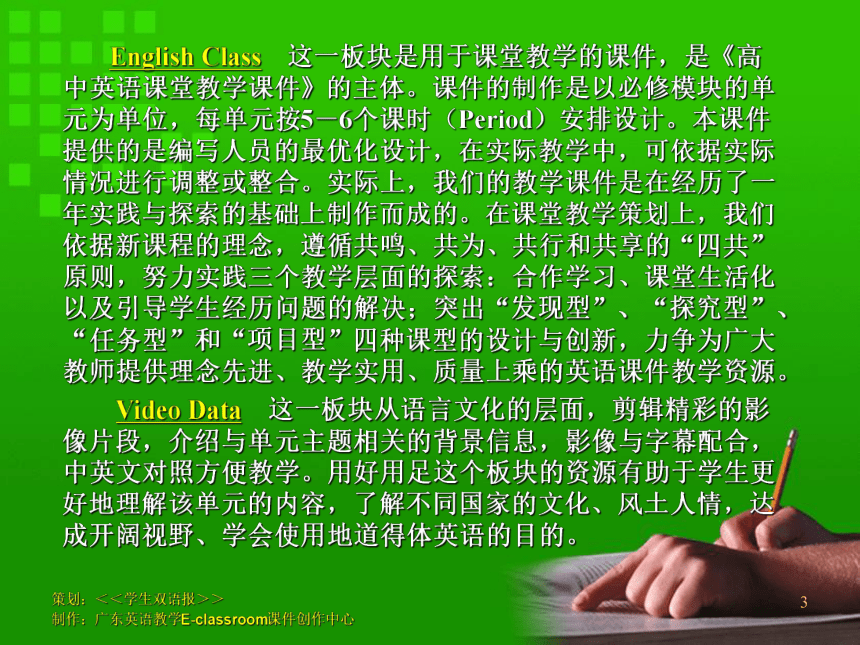
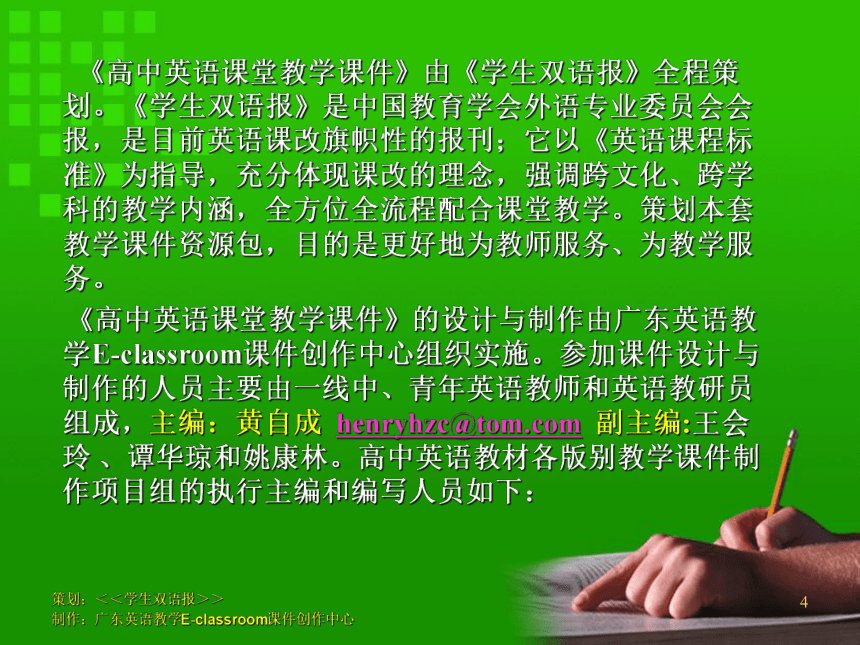
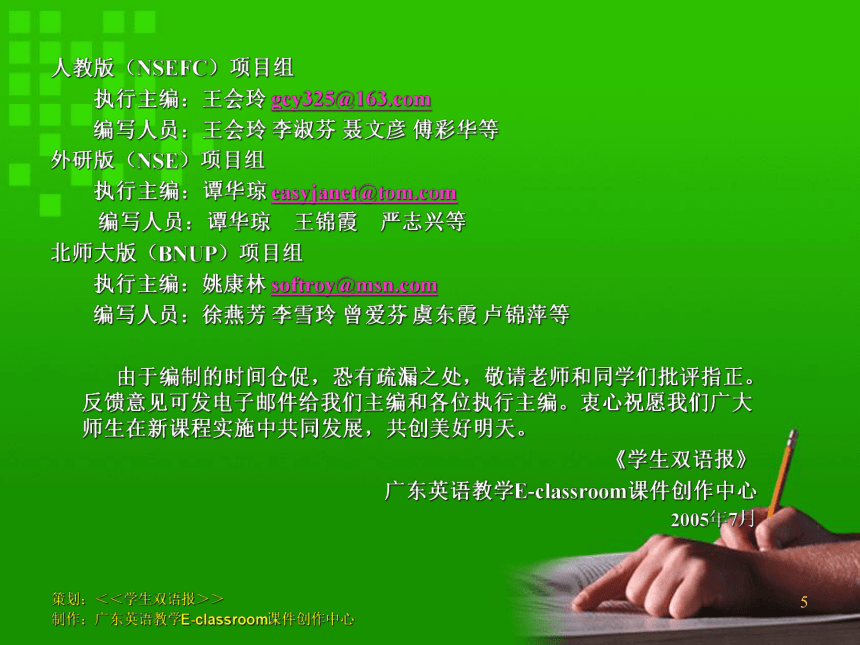

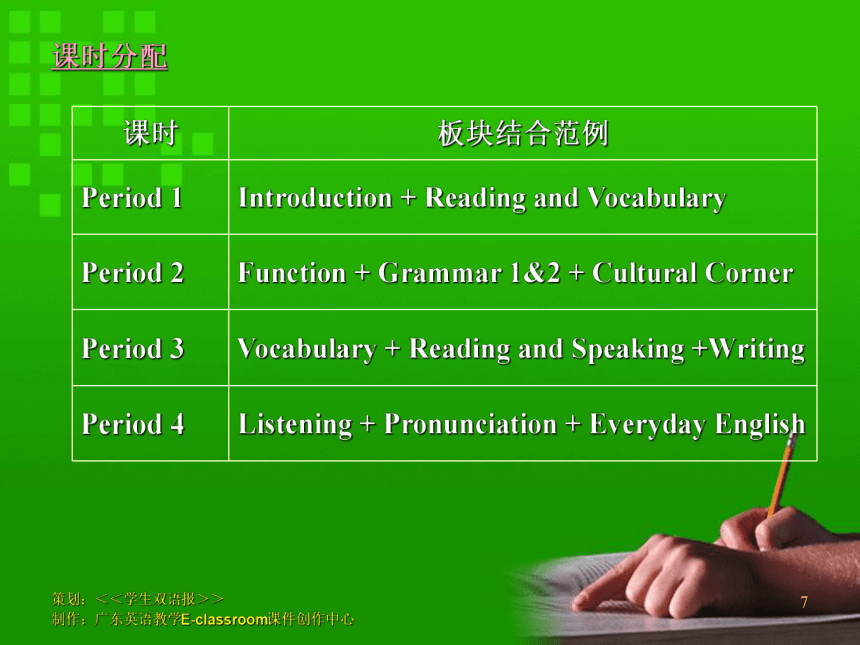
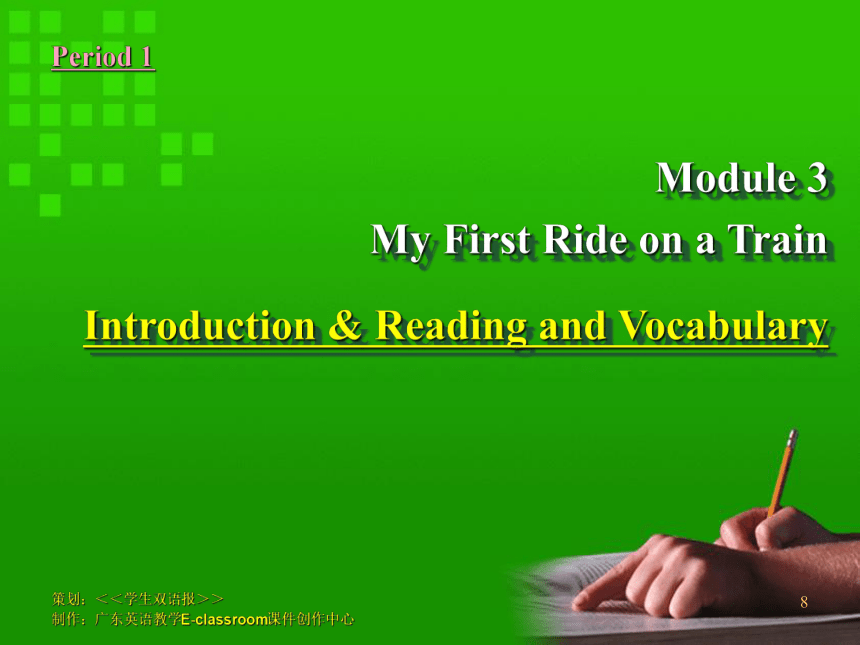
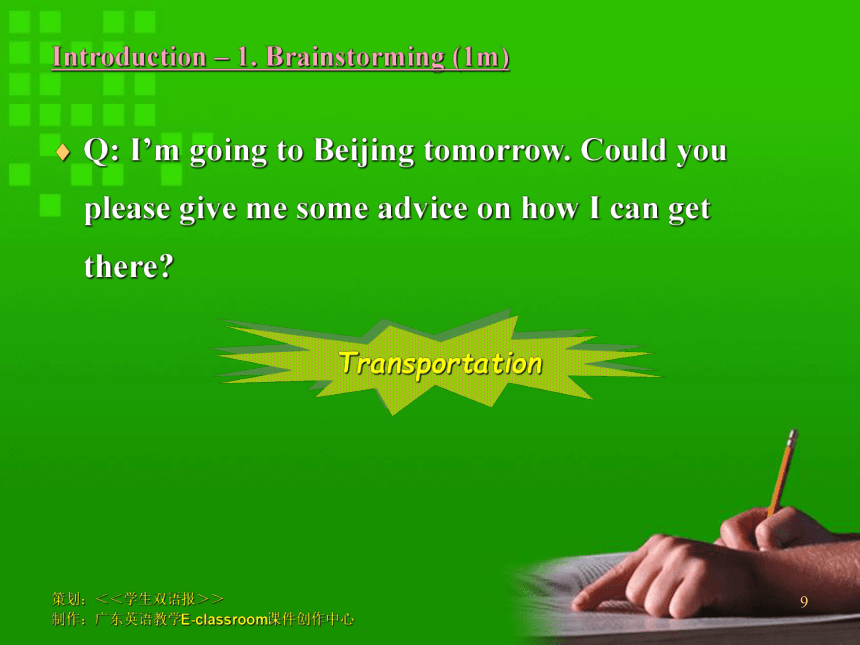
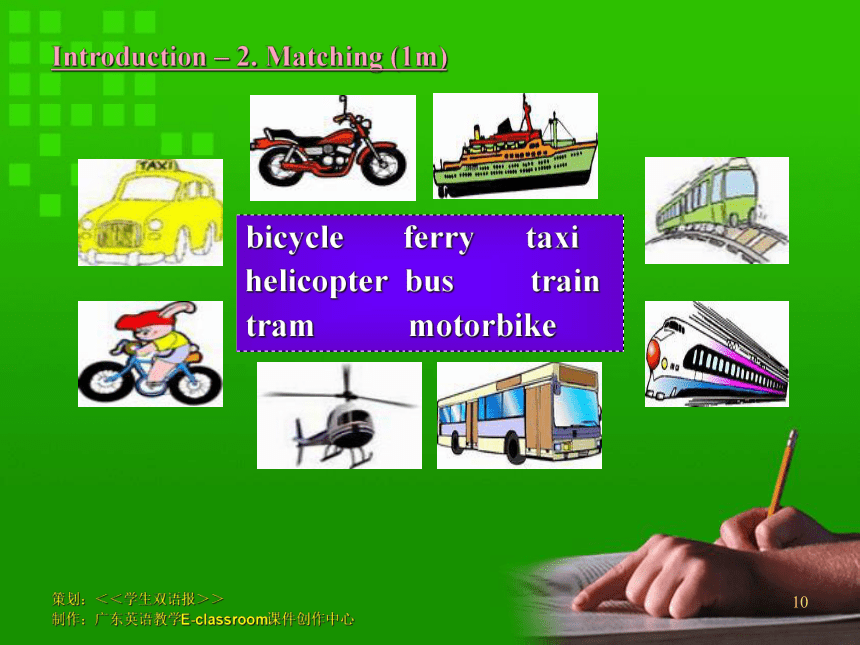
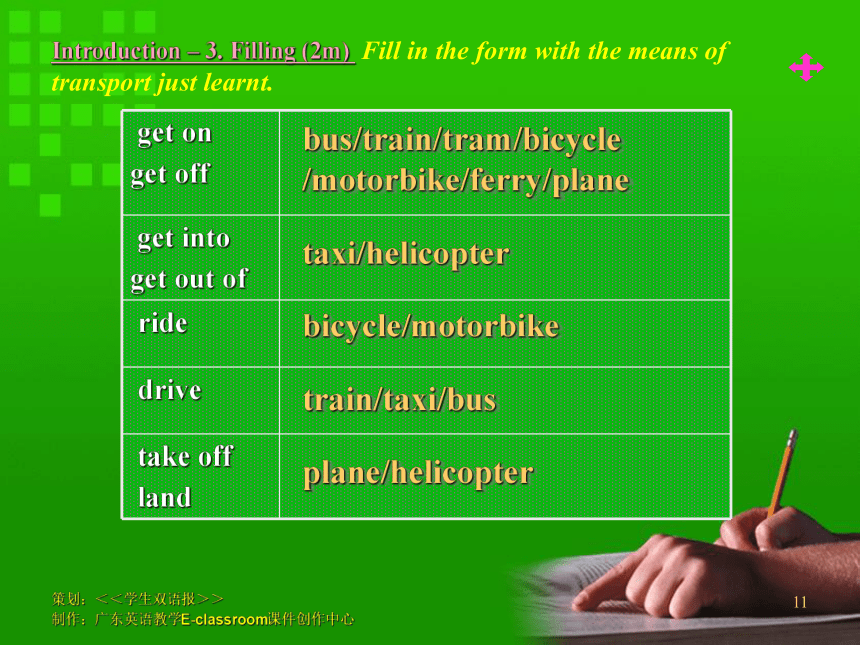
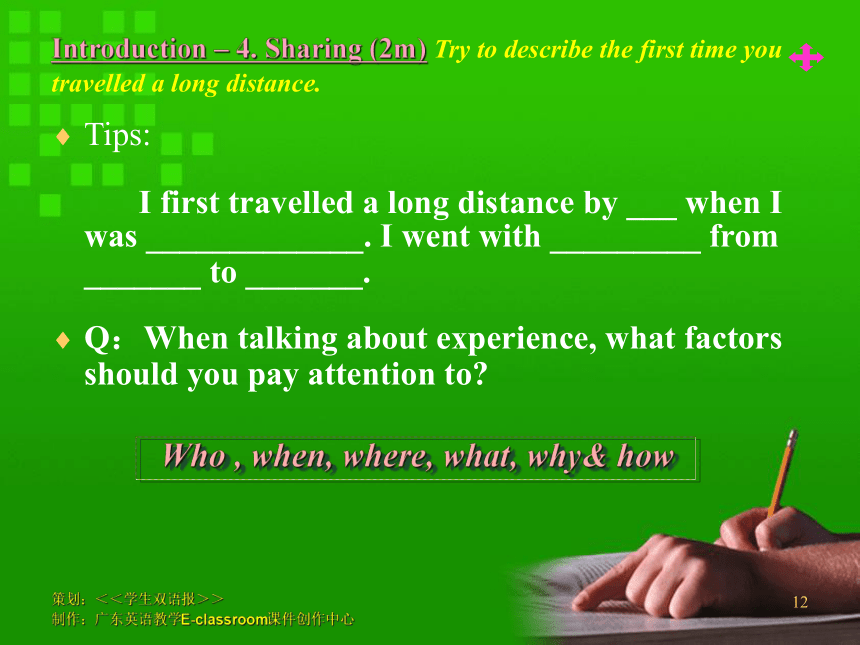
文档简介
课件65张PPT。1外研版第一册 Module 3 My First Ride on a Train 策划:《学生双语报》
制作:广东英语教学E-classroom课件创作中心
外研版(NSE)项目组
外研版高中英语第一册(必修一)2前 言 2004年秋国家开始普通高中新课程实验。新课程、新理念、新教材给英语教育发展带来机遇和挑战;新型的自主、合作和探究的学习方式给英语课堂注入生机和活力。英语教学回归生活、回归时代、还语言教学本来面目,正在成为广大英语教师的共识和教学行为。为配合新课程的实施、服务课堂教学,我们组织制作了新课程《高中英语课堂教学课件》,它根据各版别高中英语教材的必修模块而制作,课件内容与教材相对应、与课堂教学整个流程同步。每个单元分别由三大板块构成:
English Song 这一板块提供1-2首英文歌曲。歌曲的内容与教学主题密切相关,以MTV或自娱自乐的Karaoke的形式制作。充分利用此板块资源,以营造英语学习氛围、陶冶情操和激发学习英语的兴趣。3 English Class 这一板块是用于课堂教学的课件,是《高中英语课堂教学课件》的主体。课件的制作是以必修模块的单元为单位,每单元按5-6个课时(Period)安排设计。本课件提供的是编写人员的最优化设计,在实际教学中,可依据实际情况进行调整或整合。实际上,我们的教学课件是在经历了一年实践与探索的基础上制作而成的。在课堂教学策划上,我们依据新课程的理念,遵循共鸣、共为、共行和共享的“四共”原则,努力实践三个教学层面的探索:合作学习、课堂生活化以及引导学生经历问题的解决;突出“发现型”、“探究型”、“任务型”和“项目型”四种课型的设计与创新,力争为广大教师提供理念先进、教学实用、质量上乘的英语课件教学资源。
Video Data 这一板块从语言文化的层面,剪辑精彩的影像片段,介绍与单元主题相关的背景信息,影像与字幕配合,中英文对照方便教学。用好用足这个板块的资源有助于学生更好地理解该单元的内容,了解不同国家的文化、风土人情,达成开阔视野、学会使用地道得体英语的目的。 4 《高中英语课堂教学课件》由《学生双语报》全程策划。《学生双语报》是中国教育学会外语专业委员会会报,是目前英语课改旗帜性的报刊;它以《英语课程标准》为指导,充分体现课改的理念,强调跨文化、跨学科的教学内涵,全方位全流程配合课堂教学。策划本套教学课件资源包,目的是更好地为教师服务、为教学服务。
《高中英语课堂教学课件》的设计与制作由广东英语教学E-classroom课件创作中心组织实施。参加课件设计与制作的人员主要由一线中、青年英语教师和英语教研员组成,主编:黄自成 henryhzc@tom.com 副主编:王会玲 、谭华琼和姚康林。高中英语教材各版别教学课件制作项目组的执行主编和编写人员如下:
5人教版(NSEFC)项目组
执行主编:王会玲 gcy325@163.com
编写人员:王会玲 李淑芬 聂文彦 傅彩华等
外研版(NSE)项目组
执行主编:谭华琼 easyjanet@tom.com
编写人员:谭华琼 王锦霞 严志兴等
北师大版(BNUP)项目组
执行主编:姚康林 softroy@msn.com
编写人员:徐燕芳 李雪玲 曾爱芬 虞东霞 卢锦萍等
由于编制的时间仓促,恐有疏漏之处,敬请老师和同学们批评指正。反馈意见可发电子邮件给我们主编和各位执行主编。衷心祝愿我们广大师生在新课程实施中共同发展,共创美好明天。
《学生双语报》
广东英语教学E-classroom课件创作中心
2005年7月 6English Song
English Class
Language Data
Video Data7课时分配8Period 1Module 3
My First Ride on a Train
Introduction & Reading and Vocabulary9Introduction – 1. Brainstorming (1m)Q: I’m going to Beijing tomorrow. Could you please give me some advice on how I can get there?
Transportation10Introduction – 2. Matching (1m)bicycle ferry taxi
helicopter bus train
tram motorbike11Introduction – 3. Filling (2m) Fill in the form with the means of transport just learnt.bus/train/tram/bicycle
/motorbike/ferry/planetaxi/helicopterbicycle/motorbiketrain/taxi/busplane/helicopter12Introduction – 4. Sharing (2m) Try to describe the first time you travelled a long distance. Tips:
I first travelled a long distance by ___ when I was _____________. I went with _________ from _______ to _______.
Q:When talking about experience, what factors should you pay attention to? Who , when, where, what, why& how13Pre-reading – 1. Discussion (2m) Q: What country are we going to talk about?Australia
Sydney
koala bear
kangaroo
camels
the central part of...
desert14Pre-reading – 2. Sharing (2m) Discuss the following questions.Do you know how many people live there?
Do you know the name of the capital city?
Where do you think most of the people live, in the central part of the country or on the coast?
What do you think the central part of the country is like?
What Australian animals do you know about?About 20 million.Canberra.On the east/southeast coast.Desert.Koala bear, platypus, kangaroo, possum...15Pre-reading – 3. Prediction (2m) Choose the words which you think can be used to describe a train trip to Australia . Why do you think so? 16Pre-reading – 4. Word-consolidation (2m) Use new word just learnt to take the place of the underlined part. Not long ago( ), I had a wonderful trip to Hainan. It’s not an area of dry land ( ), because it’s surrounded by sea. There you can always enjoy the beautiful sunshine, green trees and blue water( ). On the beaches, you can’t find any valuable stones( ), but you can always touch the soft sand instead. On my way back, I made friends with some of the people traveling on the train( ).
Recentlydesertscenerydiamondspassengers17Fast reading – 1. Main idea (3m) Read the passage as fast as possible, then choose the right answer.What’s the passage about?
a train ride to Sydney
taking the train to Australia
travelling to the central part of Australia
a child visiting her grandmother18Fast reading – 2. Main idea(2m) Find out what each paragraph is mainly about. I had my first ride on a long distance train.Why is the train called Ghan?The scenery along the railway.The fate of the camels nowadays Things about the camels.How I spent the time in the train.19Detailed reading – Questions (8m) Go through the questions below and then read the passage for answers. Did Alice travel on the train a long time ago?
Was her destination on the coast of Australia?
Was the scenery the same during the whole journey?
Did she study while she was on the train?
Did the Australians use horses to travel to the central part of the country?
Do they still use camels to deliver goods?20Jigsaw reading – Details sharing (5m) Group 1 read part 1; Group 2 read paragraph 2 and 3; Group 3 read for the rest. All groups find out details as shown below.For Group 1 (P1)
For Group 2 (P2 & 3)21For Group 3 (P4 & 5 & 6)
__________________, camels were trained to carry supplies back from the central part.
_________, camels were shot because of the new railway line built by the government.
_____________________________, they brought camels from Afghanistan.
_________________, Australians needed a way to the central country. They tried riding horses, but failed.Put me in the right order and form a passage, adding in the time signals.1. A long time ago2. A hundred and fifty years ago3. For many years4. In 193522Language points – 1. Phrases (3m) Underline those you think are useful or difficult, then talk about them with your group members.come from
a long-distance train
get on
get off
in the middle of
more than
dark red
look out of
at midnight
travel to
be short for
not...any more
allow...to
in one day
23Language points – 2. Sentences (3m)What a ride!
We ate great meals cooked by experts!
We saw abandoned farms which were built more than a hundred years ago.
They tried riding horses, but the horses didn’t like the hot weather and sand.
In 1925, they passed a law which allowed people to shoot the animals if they were a problem.
24Discussion (7m) Discuss the following questions, first in four, then present the ideas to the whole class.What sort of people do you think travel on the Ghan train?
What kind of towns and villages do you think the train passed?
In 1935, the police shot 15 camels in one day in Australia. What do you think about that?25Homework Try to find out some pictures or other information about your first trip, either by train or by air, and get ready to tell that experience using the words and expressions learnt today.26
Recently I had my first ride on a long-distance train.
long-distance 长途的
注意其他复合词表达法:
(1)n. birth-control speed-reading daughter-in-law
(2)v. baby-sit house-keep window-shop
(3)adj. kind-hearted absent-minded good-looking附:(Language points)272. I sat and looked out of the window.
look out往外看 look out of看…的外面
(1)look 短语:
She looked but saw nothing.
She looked after Cassie when her mother’s ill.
She looked around (round) the room to see who was absent.
He saw a stranger looking forward her at opposite side.
The traveller looked into the distance and finally saw a car coming.28Looking into the future, we are full of confidence.
They were looking forward to a brighter future.
What are you looking for?
Looking through his thick glasses, the teacher found Tom making a face.
(2)Look+副词:
look back look on look up look in
(3)Look作系动词:
She looks cheerful and healthy.
They looked embarrassed.
They looked as if they didn’t know.29The Afghans and their camels did this until 1920s.
注意until的不同用法:
They stayed in Beijing until the end of August.
She stood there until her son walked out of sight.
She will live here until she has finished her master’s degree.
They didn’t leave Beijing until the end of August.
They heard nothing of him until they received his letter.
注意时间表达法:
the 1920s 二十世纪二十年代
in her 80s 在她八十多岁的时候30Period 2Module 3
My First Ride on a Train
Function + Grammar 1&2 + Cultural Corner
31Function: 1. Reading (3m) Read the conversation between a ticket inspector and a passenger on a train. Then discuss the questions on the right.Being polite
What does the ticket inspector want?
What do you think of the ticket inspector’s attitude?
What expressions could you use to change it?
ticket inspector32Function – 2. New dialogue (6m) Make a new conversation between the ticket inspector and the passenger using the following polite expressions. Excuse me... Could I (possibly)...?
Would you mind (doing) ...? Would you mind if ...?
I’m very sorry but ... That fact is that ...Now add more lines to it using some of the questions below. What time does the train arrive at...?
Where do I change to get to...?
Is it possible to open the window?
Is there a dining car on the train?
...33Grammar 1 – 1. Observation & Discussion (4m) Recall the sentences from My First Ride on a Train, and fill in the blanks with one proper word, then discuss the questions below._________ camels carried food and other supplies.
We saw ____________ farms which were more than a hundred years ago.
We ate great meals __________ by experts. Are these words past participles of verbs?
What part of speech are these words used in the sentences above?
What is difference between the first two and the third sentence as to the word order? Why is it like that?Trainedabandonedcooked34Grammar 1 – 2. Practice(3m) Choose the words in the box to complete the conversation below using past participles as adjectives. A: Is it the first time for you to travel on a bus? You look _________.
B: Yes. But you seem to be a little _________.
A: I am. Look, the traffic jam again. Drivers are easy to get __________ when they know they have to delay having lunch again.
bore exhaust exciteexcitedboredexhausted小结: (1)-ed form 于系动词后作表语35Grammar 1 – 3. Practice(4m) Rewrite the sentences using the –ed form of the verbs in brackets. They used a car to travel around Europe during their holiday. (rent)
There were a lot of cars in the accident. (damage)
The audience watched as four lions entered the circus ring. (train)
We spent the night on a farm. (abandon)...a rented car......a lot of damaged cars......four trained lions......an abandoned farm...小结: (2)-ed form 于名词前作前置定语36Grammar 1 – 4. Practice(4m) Finish the sentences with your ideas. eg: We live in the house decorated by them.
We bought a camera ________________________.
I saw a film ________________________________.
I ate an excellent meal _______________________.
I read two books ____________________________.小结: (3)-ed form与其它词构成短语时,要
置于名词后作后后置定语37Grammar 2 – 1. Discussion (4m) Find the time expressions in My First Ride on a Train. Then discuss the following question.recently during the day One night
at midnight a long time ago until the 1920s
a hundred and fifty years ago in 1925Q: Which of them can refer to past or present actions ?
38Grammar 2 – 2. Practice (3m) Use similar time expressions to complete the sentences. (open answers)People first started traveling by train _________.
We had a nice holiday last year. __________, we visited museums. _____, we went to a music club.
There are a lot of cars in cities nowadays. ______, you could see a lot more bicycles in the streets.
_____, I traveled by bus to meet a friend of mine who now lives in another city.
________, there was a huge railway station in the middle of the city, but it isn’t there any more.
39Grammar 2 – 3. Task (5m) Find out about your partner’s information. You may want to use:
What did you do ...?
40Cultural corner – 1. Extensive Reading (5m)Pre-reading questions:
What do you know about the maglev?
What are the main differences between a magnetically levitated train and an ordinary train?
41Cultural corner – 2. Discussion (4m)What are the advantages and disadvantages of the Maglev – the fastest train in the world?42HomeworkTry to find some pictures of you when you were younger or other pictures you think are interesting. Bring them to school in the next lesson and share your experience with your classmates. Remember to use past time expressions to describe them.43附:1. 高考题1. (02’ 海淀) From the dates ______ on the gold coin, we decided that it was made five hundred years ago.
A. marking B. marked
C. to be marked D. having been marked
2. (04’ 上海)The disc digitally _____ in the studio sounded fantastic at the party last night.
A. recorded B. recording
C. to be recorded D. having recorded AB443. (NMET 1997) I first met Lisa three years ago. She ________ at a radio shop at that time.
A. has worked B. was working
C. had been working D. had worked
4. (03’ 江西)Before I went to meet the foreign guests, my manager kept telling me to _____ my manners.
A. care B. mind
C. see D. notice
B B45Period 3Module 3
My First Ride on a Train
Vocabulary + Reading and Speaking +Writing46Vocabulary – 1. Places (3m) Draw an imaginary district map with names of places on it. Show it to the whole class.cinema circus kindergarten zoo
seaside park playground theatre
swimming pool sports stadium You may want to use:47Vocabulary – 2. Experience (4m) Share your experience of doing something for the first time with your partners, using the following sentence structures and other information as reference.I will never forget the day I ... in...
I remember the day I ...in...
I remember (doing) ...in...
I remember my first visit to...learn to ride a bicycle see a wild animal
play sports for the first time swim
read comic books learn to draw
meet your best friend see a filmYou may want to use:48Reading and Speaking – 1. Jigsaw reading (13m) Work in groups of five. Read the passage, one paragraph for each student. After reading, try to get as much information as you can from your group members to complete the form below. One student from each group report it to all.49Reading and Speaking – 2. Questions(4m) 1. What are these passages about?
2. Which are happy and which are unhappy?
3. What do you notice when writing about childhood memories?People’s childhood memories.Happy: Paragraph 1, 4, 5
Unhappy: Paragraph 2, 3(open answers)50Writing – 1. Brainstorming (3m) Choose one of the four topics. Try to share experiences with your group members according to the topic. Put down anything you think are useful in your writing.My first family holiday
The most unusual journey I’ve made
My first train ride
The best journey of my life51Writing – 2. Basic information (2m) Complete the following chart before you start writing the composition. 52Writing – 3. Writing (6m) Write a short passage according to the basic information filled by yourself. You may want to use...
I will never forget the day I ... in...
I remember the day I ...in...
I remember (doing) ...in...
I remember my first visit to...
...
53Writing – 4. Peer checking and rewriting (10m) Read your writing to your partner. Check and rewrite your writing according to the following. Then share it with the whole class.Are you clear what happen(4W, H and Result)
Do you know the writer’s attitude and emotion?
Are there any good connecting words or phrases?
Are there any good phrases or sentences?
Are there any spelling mistakes? 54Homework Write your description of a trip, using Activity 14 and 16 on Page 84 in Workbook as reference.55附:(高考题)(97’ NMET) 下列图画描述的是你的一段亲身经历,请据此为一家中学生英文报的故事专栏写一篇短文。注意:1.短文必须包括图画所表现的主要内容,可以适当增加细节,使其连贯、完整。 2.叙述必须用第一人称。3.词数100左右。 生词:违章者-offender n. 十字路口-crossroads n.56Period 4Module 3
My First Ride on a Train
Listening + Pronunciation + Everyday English
57Pre-listening – 1. Prediction I (2m) Look at the information form of Mary Lennon. If you are going to have an interview with her, what questions will you ask her? 58Pre-listening – 2. Prediction II (3m) Try to predict the answers to the following questions.When did she first go to America?
How old was she?
How did she get there?
What did she do in New York?
How did she get from New York to California?
Where did she stop on the way?
What did she think of Los Angeles?59Listening – 1. Main idea (15m) Listen to the interview twice and answer the questions in Part 1.In 1934.
19.
By ship
She met a lot of people and she went to some parties.
By train.
Chicago.
It was too hot.Answers:60Pronunciation – Listening and note-taking (5m) Listen and underline the words which are stressed.I=Interviewer M=Mary Lennon
I: Did you travel by plane?
M: By plane? No, of course not! We traveled by ship!
I: How long did that take?
M: About seven days.
I: Did you enjoy it?
M: No, I hated it!
I: Why? Were you sick?
M: No, I was bored.Now read it with your partner.61Everyday English – 1.Recalling (2m) Recall the conversation and fill in expressions.I: __________, Mary, where were you born?
M: I was born in London.
I: _________? And when did you go to America?
M: In 1934, when I was 19 years old, I went to New
York.
I: _____________? Did you travel by plane?
M: By plane? No, _____________! We traveled by
ship!
I: ___________! Tell me ReallyIs that rightof course not Goodness 62Everyday English – 2. Questions(3m)1. Why does the interviewer use these expressions? Is it possible for her to do the interview without them?
2. What do Mary Lennon’s expressions tell you?
Can you recall more expressions from the conversation?63Everyday English – 3. Filling(5m) Use phrases learnt to complete the conversation. I=Interviewer M=Miss O’Dell I: Miss, _________ ask you some questions?
M: _______! ________ what you want to know about me.
I: _________________ telling us your favorite sport?
M: ____________. It’s jogging. I jog anywhere I can.
I: ___, _____. Perhaps you think it’s good for your health?
M: ____________!
I: __________________ I ask something about your boyfriend?
M: ___________________ I don’t think I’d talk about it.
I: Never mind! _________________ know where you live?
M: Of course. I am now living in London.could I Oh yes Tell me Would you mind Not at allOh, I see AbsolutelyWould you mind ifI’m very sorry butCould I possibly64Activity - Interview (10m ) Suppose you are now at a radio station. One is a host of a program named “Celebrities”. The other is Mary Lennon, a silent movie actress. You are having an interview on air. Ask Mary Lennon about her experience when she was young. Use the information you get from the listening as reference.65Homework Try to search information about Charles Spencer Chaplin (卓别林). Make a shot note of his experience. Then make a conversation with your partner, taking about his experience.
制作:广东英语教学E-classroom课件创作中心
外研版(NSE)项目组
外研版高中英语第一册(必修一)2前 言 2004年秋国家开始普通高中新课程实验。新课程、新理念、新教材给英语教育发展带来机遇和挑战;新型的自主、合作和探究的学习方式给英语课堂注入生机和活力。英语教学回归生活、回归时代、还语言教学本来面目,正在成为广大英语教师的共识和教学行为。为配合新课程的实施、服务课堂教学,我们组织制作了新课程《高中英语课堂教学课件》,它根据各版别高中英语教材的必修模块而制作,课件内容与教材相对应、与课堂教学整个流程同步。每个单元分别由三大板块构成:
English Song 这一板块提供1-2首英文歌曲。歌曲的内容与教学主题密切相关,以MTV或自娱自乐的Karaoke的形式制作。充分利用此板块资源,以营造英语学习氛围、陶冶情操和激发学习英语的兴趣。3 English Class 这一板块是用于课堂教学的课件,是《高中英语课堂教学课件》的主体。课件的制作是以必修模块的单元为单位,每单元按5-6个课时(Period)安排设计。本课件提供的是编写人员的最优化设计,在实际教学中,可依据实际情况进行调整或整合。实际上,我们的教学课件是在经历了一年实践与探索的基础上制作而成的。在课堂教学策划上,我们依据新课程的理念,遵循共鸣、共为、共行和共享的“四共”原则,努力实践三个教学层面的探索:合作学习、课堂生活化以及引导学生经历问题的解决;突出“发现型”、“探究型”、“任务型”和“项目型”四种课型的设计与创新,力争为广大教师提供理念先进、教学实用、质量上乘的英语课件教学资源。
Video Data 这一板块从语言文化的层面,剪辑精彩的影像片段,介绍与单元主题相关的背景信息,影像与字幕配合,中英文对照方便教学。用好用足这个板块的资源有助于学生更好地理解该单元的内容,了解不同国家的文化、风土人情,达成开阔视野、学会使用地道得体英语的目的。 4 《高中英语课堂教学课件》由《学生双语报》全程策划。《学生双语报》是中国教育学会外语专业委员会会报,是目前英语课改旗帜性的报刊;它以《英语课程标准》为指导,充分体现课改的理念,强调跨文化、跨学科的教学内涵,全方位全流程配合课堂教学。策划本套教学课件资源包,目的是更好地为教师服务、为教学服务。
《高中英语课堂教学课件》的设计与制作由广东英语教学E-classroom课件创作中心组织实施。参加课件设计与制作的人员主要由一线中、青年英语教师和英语教研员组成,主编:黄自成 henryhzc@tom.com 副主编:王会玲 、谭华琼和姚康林。高中英语教材各版别教学课件制作项目组的执行主编和编写人员如下:
5人教版(NSEFC)项目组
执行主编:王会玲 gcy325@163.com
编写人员:王会玲 李淑芬 聂文彦 傅彩华等
外研版(NSE)项目组
执行主编:谭华琼 easyjanet@tom.com
编写人员:谭华琼 王锦霞 严志兴等
北师大版(BNUP)项目组
执行主编:姚康林 softroy@msn.com
编写人员:徐燕芳 李雪玲 曾爱芬 虞东霞 卢锦萍等
由于编制的时间仓促,恐有疏漏之处,敬请老师和同学们批评指正。反馈意见可发电子邮件给我们主编和各位执行主编。衷心祝愿我们广大师生在新课程实施中共同发展,共创美好明天。
《学生双语报》
广东英语教学E-classroom课件创作中心
2005年7月 6English Song
English Class
Language Data
Video Data7课时分配8Period 1Module 3
My First Ride on a Train
Introduction & Reading and Vocabulary9Introduction – 1. Brainstorming (1m)Q: I’m going to Beijing tomorrow. Could you please give me some advice on how I can get there?
Transportation10Introduction – 2. Matching (1m)bicycle ferry taxi
helicopter bus train
tram motorbike11Introduction – 3. Filling (2m) Fill in the form with the means of transport just learnt.bus/train/tram/bicycle
/motorbike/ferry/planetaxi/helicopterbicycle/motorbiketrain/taxi/busplane/helicopter12Introduction – 4. Sharing (2m) Try to describe the first time you travelled a long distance. Tips:
I first travelled a long distance by ___ when I was _____________. I went with _________ from _______ to _______.
Q:When talking about experience, what factors should you pay attention to? Who , when, where, what, why& how13Pre-reading – 1. Discussion (2m) Q: What country are we going to talk about?Australia
Sydney
koala bear
kangaroo
camels
the central part of...
desert14Pre-reading – 2. Sharing (2m) Discuss the following questions.Do you know how many people live there?
Do you know the name of the capital city?
Where do you think most of the people live, in the central part of the country or on the coast?
What do you think the central part of the country is like?
What Australian animals do you know about?About 20 million.Canberra.On the east/southeast coast.Desert.Koala bear, platypus, kangaroo, possum...15Pre-reading – 3. Prediction (2m) Choose the words which you think can be used to describe a train trip to Australia . Why do you think so? 16Pre-reading – 4. Word-consolidation (2m) Use new word just learnt to take the place of the underlined part. Not long ago( ), I had a wonderful trip to Hainan. It’s not an area of dry land ( ), because it’s surrounded by sea. There you can always enjoy the beautiful sunshine, green trees and blue water( ). On the beaches, you can’t find any valuable stones( ), but you can always touch the soft sand instead. On my way back, I made friends with some of the people traveling on the train( ).
Recentlydesertscenerydiamondspassengers17Fast reading – 1. Main idea (3m) Read the passage as fast as possible, then choose the right answer.What’s the passage about?
a train ride to Sydney
taking the train to Australia
travelling to the central part of Australia
a child visiting her grandmother18Fast reading – 2. Main idea(2m) Find out what each paragraph is mainly about. I had my first ride on a long distance train.Why is the train called Ghan?The scenery along the railway.The fate of the camels nowadays Things about the camels.How I spent the time in the train.19Detailed reading – Questions (8m) Go through the questions below and then read the passage for answers. Did Alice travel on the train a long time ago?
Was her destination on the coast of Australia?
Was the scenery the same during the whole journey?
Did she study while she was on the train?
Did the Australians use horses to travel to the central part of the country?
Do they still use camels to deliver goods?20Jigsaw reading – Details sharing (5m) Group 1 read part 1; Group 2 read paragraph 2 and 3; Group 3 read for the rest. All groups find out details as shown below.For Group 1 (P1)
For Group 2 (P2 & 3)21For Group 3 (P4 & 5 & 6)
__________________, camels were trained to carry supplies back from the central part.
_________, camels were shot because of the new railway line built by the government.
_____________________________, they brought camels from Afghanistan.
_________________, Australians needed a way to the central country. They tried riding horses, but failed.Put me in the right order and form a passage, adding in the time signals.1. A long time ago2. A hundred and fifty years ago3. For many years4. In 193522Language points – 1. Phrases (3m) Underline those you think are useful or difficult, then talk about them with your group members.come from
a long-distance train
get on
get off
in the middle of
more than
dark red
look out of
at midnight
travel to
be short for
not...any more
allow...to
in one day
23Language points – 2. Sentences (3m)What a ride!
We ate great meals cooked by experts!
We saw abandoned farms which were built more than a hundred years ago.
They tried riding horses, but the horses didn’t like the hot weather and sand.
In 1925, they passed a law which allowed people to shoot the animals if they were a problem.
24Discussion (7m) Discuss the following questions, first in four, then present the ideas to the whole class.What sort of people do you think travel on the Ghan train?
What kind of towns and villages do you think the train passed?
In 1935, the police shot 15 camels in one day in Australia. What do you think about that?25Homework Try to find out some pictures or other information about your first trip, either by train or by air, and get ready to tell that experience using the words and expressions learnt today.26
Recently I had my first ride on a long-distance train.
long-distance 长途的
注意其他复合词表达法:
(1)n. birth-control speed-reading daughter-in-law
(2)v. baby-sit house-keep window-shop
(3)adj. kind-hearted absent-minded good-looking附:(Language points)272. I sat and looked out of the window.
look out往外看 look out of看…的外面
(1)look 短语:
She looked but saw nothing.
She looked after Cassie when her mother’s ill.
She looked around (round) the room to see who was absent.
He saw a stranger looking forward her at opposite side.
The traveller looked into the distance and finally saw a car coming.28Looking into the future, we are full of confidence.
They were looking forward to a brighter future.
What are you looking for?
Looking through his thick glasses, the teacher found Tom making a face.
(2)Look+副词:
look back look on look up look in
(3)Look作系动词:
She looks cheerful and healthy.
They looked embarrassed.
They looked as if they didn’t know.29The Afghans and their camels did this until 1920s.
注意until的不同用法:
They stayed in Beijing until the end of August.
She stood there until her son walked out of sight.
She will live here until she has finished her master’s degree.
They didn’t leave Beijing until the end of August.
They heard nothing of him until they received his letter.
注意时间表达法:
the 1920s 二十世纪二十年代
in her 80s 在她八十多岁的时候30Period 2Module 3
My First Ride on a Train
Function + Grammar 1&2 + Cultural Corner
31Function: 1. Reading (3m) Read the conversation between a ticket inspector and a passenger on a train. Then discuss the questions on the right.Being polite
What does the ticket inspector want?
What do you think of the ticket inspector’s attitude?
What expressions could you use to change it?
ticket inspector32Function – 2. New dialogue (6m) Make a new conversation between the ticket inspector and the passenger using the following polite expressions. Excuse me... Could I (possibly)...?
Would you mind (doing) ...? Would you mind if ...?
I’m very sorry but ... That fact is that ...Now add more lines to it using some of the questions below. What time does the train arrive at...?
Where do I change to get to...?
Is it possible to open the window?
Is there a dining car on the train?
...33Grammar 1 – 1. Observation & Discussion (4m) Recall the sentences from My First Ride on a Train, and fill in the blanks with one proper word, then discuss the questions below._________ camels carried food and other supplies.
We saw ____________ farms which were more than a hundred years ago.
We ate great meals __________ by experts. Are these words past participles of verbs?
What part of speech are these words used in the sentences above?
What is difference between the first two and the third sentence as to the word order? Why is it like that?Trainedabandonedcooked34Grammar 1 – 2. Practice(3m) Choose the words in the box to complete the conversation below using past participles as adjectives. A: Is it the first time for you to travel on a bus? You look _________.
B: Yes. But you seem to be a little _________.
A: I am. Look, the traffic jam again. Drivers are easy to get __________ when they know they have to delay having lunch again.
bore exhaust exciteexcitedboredexhausted小结: (1)-ed form 于系动词后作表语35Grammar 1 – 3. Practice(4m) Rewrite the sentences using the –ed form of the verbs in brackets. They used a car to travel around Europe during their holiday. (rent)
There were a lot of cars in the accident. (damage)
The audience watched as four lions entered the circus ring. (train)
We spent the night on a farm. (abandon)...a rented car......a lot of damaged cars......four trained lions......an abandoned farm...小结: (2)-ed form 于名词前作前置定语36Grammar 1 – 4. Practice(4m) Finish the sentences with your ideas. eg: We live in the house decorated by them.
We bought a camera ________________________.
I saw a film ________________________________.
I ate an excellent meal _______________________.
I read two books ____________________________.小结: (3)-ed form与其它词构成短语时,要
置于名词后作后后置定语37Grammar 2 – 1. Discussion (4m) Find the time expressions in My First Ride on a Train. Then discuss the following question.recently during the day One night
at midnight a long time ago until the 1920s
a hundred and fifty years ago in 1925Q: Which of them can refer to past or present actions ?
38Grammar 2 – 2. Practice (3m) Use similar time expressions to complete the sentences. (open answers)People first started traveling by train _________.
We had a nice holiday last year. __________, we visited museums. _____, we went to a music club.
There are a lot of cars in cities nowadays. ______, you could see a lot more bicycles in the streets.
_____, I traveled by bus to meet a friend of mine who now lives in another city.
________, there was a huge railway station in the middle of the city, but it isn’t there any more.
39Grammar 2 – 3. Task (5m) Find out about your partner’s information. You may want to use:
What did you do ...?
40Cultural corner – 1. Extensive Reading (5m)Pre-reading questions:
What do you know about the maglev?
What are the main differences between a magnetically levitated train and an ordinary train?
41Cultural corner – 2. Discussion (4m)What are the advantages and disadvantages of the Maglev – the fastest train in the world?42HomeworkTry to find some pictures of you when you were younger or other pictures you think are interesting. Bring them to school in the next lesson and share your experience with your classmates. Remember to use past time expressions to describe them.43附:1. 高考题1. (02’ 海淀) From the dates ______ on the gold coin, we decided that it was made five hundred years ago.
A. marking B. marked
C. to be marked D. having been marked
2. (04’ 上海)The disc digitally _____ in the studio sounded fantastic at the party last night.
A. recorded B. recording
C. to be recorded D. having recorded AB443. (NMET 1997) I first met Lisa three years ago. She ________ at a radio shop at that time.
A. has worked B. was working
C. had been working D. had worked
4. (03’ 江西)Before I went to meet the foreign guests, my manager kept telling me to _____ my manners.
A. care B. mind
C. see D. notice
B B45Period 3Module 3
My First Ride on a Train
Vocabulary + Reading and Speaking +Writing46Vocabulary – 1. Places (3m) Draw an imaginary district map with names of places on it. Show it to the whole class.cinema circus kindergarten zoo
seaside park playground theatre
swimming pool sports stadium You may want to use:47Vocabulary – 2. Experience (4m) Share your experience of doing something for the first time with your partners, using the following sentence structures and other information as reference.I will never forget the day I ... in...
I remember the day I ...in...
I remember (doing) ...in...
I remember my first visit to...learn to ride a bicycle see a wild animal
play sports for the first time swim
read comic books learn to draw
meet your best friend see a filmYou may want to use:48Reading and Speaking – 1. Jigsaw reading (13m) Work in groups of five. Read the passage, one paragraph for each student. After reading, try to get as much information as you can from your group members to complete the form below. One student from each group report it to all.49Reading and Speaking – 2. Questions(4m) 1. What are these passages about?
2. Which are happy and which are unhappy?
3. What do you notice when writing about childhood memories?People’s childhood memories.Happy: Paragraph 1, 4, 5
Unhappy: Paragraph 2, 3(open answers)50Writing – 1. Brainstorming (3m) Choose one of the four topics. Try to share experiences with your group members according to the topic. Put down anything you think are useful in your writing.My first family holiday
The most unusual journey I’ve made
My first train ride
The best journey of my life51Writing – 2. Basic information (2m) Complete the following chart before you start writing the composition. 52Writing – 3. Writing (6m) Write a short passage according to the basic information filled by yourself. You may want to use...
I will never forget the day I ... in...
I remember the day I ...in...
I remember (doing) ...in...
I remember my first visit to...
...
53Writing – 4. Peer checking and rewriting (10m) Read your writing to your partner. Check and rewrite your writing according to the following. Then share it with the whole class.Are you clear what happen(4W, H and Result)
Do you know the writer’s attitude and emotion?
Are there any good connecting words or phrases?
Are there any good phrases or sentences?
Are there any spelling mistakes? 54Homework Write your description of a trip, using Activity 14 and 16 on Page 84 in Workbook as reference.55附:(高考题)(97’ NMET) 下列图画描述的是你的一段亲身经历,请据此为一家中学生英文报的故事专栏写一篇短文。注意:1.短文必须包括图画所表现的主要内容,可以适当增加细节,使其连贯、完整。 2.叙述必须用第一人称。3.词数100左右。 生词:违章者-offender n. 十字路口-crossroads n.56Period 4Module 3
My First Ride on a Train
Listening + Pronunciation + Everyday English
57Pre-listening – 1. Prediction I (2m) Look at the information form of Mary Lennon. If you are going to have an interview with her, what questions will you ask her? 58Pre-listening – 2. Prediction II (3m) Try to predict the answers to the following questions.When did she first go to America?
How old was she?
How did she get there?
What did she do in New York?
How did she get from New York to California?
Where did she stop on the way?
What did she think of Los Angeles?59Listening – 1. Main idea (15m) Listen to the interview twice and answer the questions in Part 1.In 1934.
19.
By ship
She met a lot of people and she went to some parties.
By train.
Chicago.
It was too hot.Answers:60Pronunciation – Listening and note-taking (5m) Listen and underline the words which are stressed.I=Interviewer M=Mary Lennon
I: Did you travel by plane?
M: By plane? No, of course not! We traveled by ship!
I: How long did that take?
M: About seven days.
I: Did you enjoy it?
M: No, I hated it!
I: Why? Were you sick?
M: No, I was bored.Now read it with your partner.61Everyday English – 1.Recalling (2m) Recall the conversation and fill in expressions.I: __________, Mary, where were you born?
M: I was born in London.
I: _________? And when did you go to America?
M: In 1934, when I was 19 years old, I went to New
York.
I: _____________? Did you travel by plane?
M: By plane? No, _____________! We traveled by
ship!
I: ___________! Tell me ReallyIs that rightof course not Goodness 62Everyday English – 2. Questions(3m)1. Why does the interviewer use these expressions? Is it possible for her to do the interview without them?
2. What do Mary Lennon’s expressions tell you?
Can you recall more expressions from the conversation?63Everyday English – 3. Filling(5m) Use phrases learnt to complete the conversation. I=Interviewer M=Miss O’Dell I: Miss, _________ ask you some questions?
M: _______! ________ what you want to know about me.
I: _________________ telling us your favorite sport?
M: ____________. It’s jogging. I jog anywhere I can.
I: ___, _____. Perhaps you think it’s good for your health?
M: ____________!
I: __________________ I ask something about your boyfriend?
M: ___________________ I don’t think I’d talk about it.
I: Never mind! _________________ know where you live?
M: Of course. I am now living in London.could I Oh yes Tell me Would you mind Not at allOh, I see AbsolutelyWould you mind ifI’m very sorry butCould I possibly64Activity - Interview (10m ) Suppose you are now at a radio station. One is a host of a program named “Celebrities”. The other is Mary Lennon, a silent movie actress. You are having an interview on air. Ask Mary Lennon about her experience when she was young. Use the information you get from the listening as reference.65Homework Try to search information about Charles Spencer Chaplin (卓别林). Make a shot note of his experience. Then make a conversation with your partner, taking about his experience.
